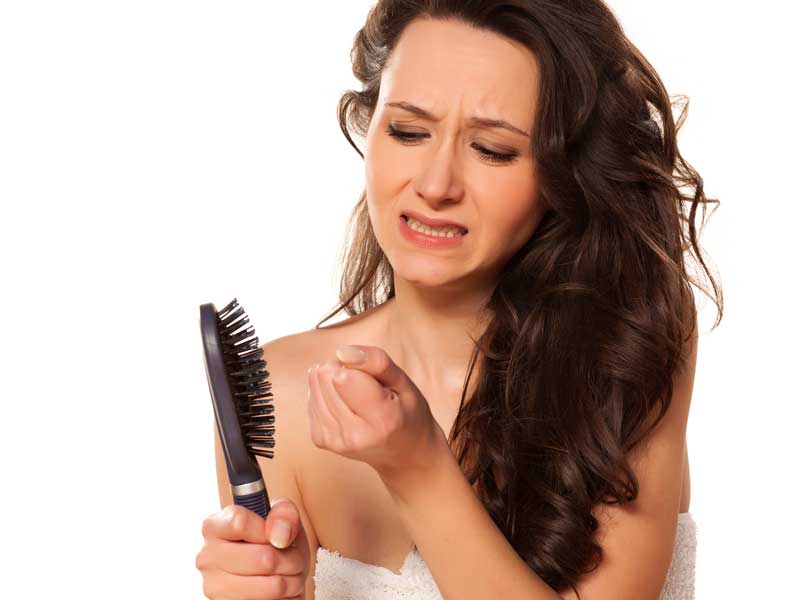It is usual for individuals to lose approximately 50 to 100 hairs each day. Considering the number of hair strands you have on your head, this number is pretty negligible. Usually, new hair replaces the hair you have lost. However, that might not be the same for all. You may experience gradual hair loss, or it might happen overnight. In such cases, you should visit an aesthetic clinic JB. Their dermatologist would examine you to identify the underlying causes and treat you accordingly. We will share the various causes of hair loss in this blog.
Your hair loss can be temporary or permanent. If you notice a large number of hairs in the drain after a shower or chunks of hair in the brush after combing, you are likely losing more hair than usual. In such cases, you need to check whether there are thinning patches of hair or a hint of baldness on your head. Such hair condition is a matter of concern. It would help if you visited your hair doctor for proper diagnosis and treatment.
Symptoms of Hair Loss
Many individuals experience hair loss in various ways. It may affect you gradually or suddenly and be limited to the scalp or your whole body. The following are the symptoms you should watch out for to diagnose this type of hair condition early.
- Sudden loss of hair – Sometimes, you may notice a handful of hair coming out after washing your hair or combing or even with gentle tugging. Usually, a physical or emotional shock is responsible for losing hair. However, it is temporary, and you may experience overall thinning hair.
- Full-body hair loss –Sometimes, patients undergoing medical treatment such as chemotherapy for cancer may also experience loss of hair all over their bodies. It is also temporary as the hair grows back eventually.
- Gradual thinning on the top of your head – This condition is one of the most common forms of hair loss that affects people as they age. Men and women often experience receding hairline on the forehead as they age.
- Circular or patches of bald spots –People may also start losing hair in circular or develop patches of bald spots on their scalp, eyebrows and even beard. Sometimes, you may experience itches on your skin before the hair falls out.
- Patching of scaling spreading all over the scalp – Ringworm is responsible for causing this type of hair issue. You may also experience other symptoms such as redness, swelling and broken hair.
Causes of Hair Loss
Now that you understand the various hair loss symptoms, let’s learn about the possible factors responsible for them. With the help of proper diagnosis, your dermatologist can offer your appropriate hair loss treatment.
Thyroid issues
Patients suffering from hypothyroidism or hyperthyroidism can lose hair due to hormonal imbalance in their bodies. Hormones are responsible for controlling different functions in the body, including hair growth. Therefore, an underactive or overactive thyroid hormone in the body can cause you to lose your hair. Your doctor might advise you to treat your health condition first in such cases. It would further help to balance your hormones and stop hair loss.
Pregnancy
Besides thyroids, conditions such as pregnancy, childbirth, menopause, etc., causes hormonal changes in the body. During those periods, women may experience thinning hair or patches of baldness. However, this condition is temporary, as they will grow back their hair with time.
Family History
Another most common cause of hair loss is a hereditary condition that occurs as one age. It is called androgenic alopecia. Men and women experience this type of hair loss gradually and predictably. It starts with bald spots and receding hairline in men, while women experience thinning hair along their scalp.
Medical Condition
Certain medical conditions can cause hair loss. For instance, Alopecia Areata is an autoimmune disorder that might cause unpredictable hair loss. Your immune system would attack healthy hair follicles and harm them in this condition. In addition, patients suffering from trichotillomania or hair-pulling disorder can feel the strong urge to pull their hair independently. Such a condition can also cause severe loss of hair.
Infections
Ringworm-caused scalp infections can cause hair loss. Further, fungal skin infections, bacterial infections such as syphilis, an infection causing high fever, etc., can cause hair loss or thinning hair. Your doctor would run health tests to identify the underlying causes of your hair loss. It would help them provide the appropriate treatment to restore hair growth and prevent hair loss in the future.
Medications
Often as a side effect of various medications, patients can experience hair loss. For instance, if you are on blood-thinning medication or oral contraceptives, it can cause thinning hair or even baldness. Sometimes, doctors may advise medications such as NSAIDs, drugs to manage depression, beta-blockers to manage abnormal heart rhythms, or calcium channel blockers to lower your blood pressure, etc. All these medications might cause hair loss afterwards. It is better to remember that excess Vitamin A or retinol can also cause hair loss.
On the other hand, chemotherapy drugs are meant to destroy cancer cells. In the process, they might also cause total loss of hair. However, your hair will slowly grow back once you need not take these medications further.
Shock to hair follicles
Sometimes, when your body experiences severe physical stress, it can disrupt the natural cycle of hair growth and rest. As a result, you may experience thinning hair, which eventually would lead to hair loss. You may notice clumps of hair falling out from your scalp in those situations. Moreover, if you are in a severe accident, experience burns injuries, or undergo surgeries, these events can shock your hair follicles. Eventually, such shock might cause loss of a higher number of hair strands, sometimes, even months after the said event.
Emotional Stress
Another cause of hair loss can be emotional stress. Whether it is any form of the financial crisis, or relationship issues, or the loss of a loved one – such levels of emotional stress can also affect your normal hair growth cycle. In those life altering situations, you may experience temporary hair loss. However, managing your stress levels can also help restore your average hair growth.
Diet deficiency
Sometimes, a diet deficiency can be responsible for causing thinning hair or baldness. Therefore, ensure to include essential vitamins, proteins and other nutrients in your diet. A healthy, nutritious and well-balanced diet is crucial to help your body function at its best. Further, they can also help prevent hair loss and maintain good health of your hair.
Extreme hair care
Being concerned about hair is natural. You may want to don a stylish hairdo for various events. However, if you are not careful enough, you may end up damaging your hair more. Some of the common hair mistakes you may commit unknowingly are – frequent shampooing of hair, blow-drying them daily, using various heated styling tools, etc., which can cause significant hair damage.
Further, if you are pulling your hair too tightly often to style it in a ponytail, etc., you may also end up losing more hair than natural. In addition, you must also refrain from rubbing your scalp vigorously. Be gentle with your hair. Consult dermatologist Johor Bahru to learn how to take proper care of hair to prevent thinning of hair or hair loss.
Diagnosis of Hair Loss
If you are experiencing persistent hair loss, it is natural to feel distressed. In such cases, we advise you to visit your dermatologist. People who experience a receding hairline consult doctors and receive early treatment may avoid permanent baldness.
Besides, if you notice patchy hair loss or more hair strands falling off the scalps after a shower or combing, consult your doctor. It can be a sign of an underlying medical condition that needs treatment.
The best dermatologist, Johor Bahru, will carry out physical exams for proper diagnosis. In addition, they might enquire about an existing medical condition, your family history, diet, hair care routine, etc. Further, they might also conduct the following health tests.
- Blood Test – It is crucial to identify the underlying medical condition responsible for your hair loss.
- Pull Test – Your doctor might gently pull your hair to check how many came out. It will help them determine the stage you are in the shredding process.
- Scalp Biopsy – Your doctor might check your skin sample or examine the hair roots and the scalp to determine whether your hair loss is due to a possible skin infection.
- Light microscopy – This type of microscopy would help diagnose the possible disorders of your hair shaft.
Thorough physical exams and health tests are needed to diagnose the cause of your hair loss. It would help your doctors to provide the appropriate treatment accordingly. Dermed Clinic is an aesthetic clinic JB that helps treat various hair and skin concerns. If you are concerned with your hair loss or thinning hair, visit Dr Muniandi of Dermed Clinic for proper treatment.
Share this Article







